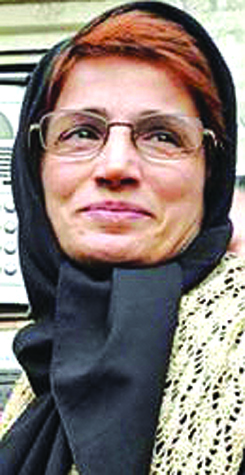November 27, 2020

Human rights lawyer Nasrin Sotoudeh has been furloughed from prison, presumably because of mounting concerns about her deteriorating health. She becomes the fourth political prisoner furloughed this year—all of them women. And three days after her release, she tested positive for the coronavirus.
On November 7, the 57-year-old “went on furlough with the approval of the prosecutor presiding over women’s ward” at Evin Prison, Mizan, the Judiciary’s news website, said without providing any further details.
Reza Khandan, Sotoudeh’s husband, confirmed the release in a tweet. “Friends, Nasrin came out on furlough a few minutes ago.”
In September, Sotoudeh was hospitalized after her physical condition worsened following weeks on a hunger strike. Her strike ended in late September after 46 days.
She had gone on a hunger strike to call for the release of political prisoners and to direct attention on their conditions amid the COVID-19 pandemic.
Tens of thousands of ordinary prisoners have been furloughed since February to curb the spread of the coronavirus. A number of them have since been required to return. The initiative only included a solitary political prisoner until recently.
Nazanin Zaghari-Ratcliffe, a dual British-Iranian national was released on furlough in March and remains on furlough to this day. She lives with her parents in Tehran and may not go more than 300 meters from their house. She wears an ankle bracelet to confirm her whereabouts.
Months went by without any other political prisoners being furloughed. But in early October, the Judiciary released Fariba Adelkah, a French-Iranian dual national, on furlough and then freed Narges Mohammadi, a human rights campaigner but not a lawyer like Sotoudeh. Mohammadi was freed when the Judiciary reduced her sentence to the time already served.
Sotoudeh, a winner of the European Parliament’s Sakharov Prize, is required by law to serve at least 12 years of her 38-year sentence before being eligible for conditional release. She has another 102 to go.
Sotoudeh was first arrested in August 2010 after representing activists and others involved in the 2009 protests against the disputed reelection of then-president Mahmud Ahmadi-nejad. The detention led to widespread recognition by the international community.
Days before President Rohani was due to appear at the United Nations, in September 2013, she was released, though it was not clear if there was any linkage.
Her second arrest, in June 2018, came on charges of espionage, dissemination of propaganda and disparaging the Supreme Leader and led to a total sentence of 38 years and 148 lashes. Under a new change in the Iranian penal code prisoners must serve the longest term of those on charges a prisoner is convicted. In Sotoudeh’s case, that is 12 years.
During her first years in jail, Sotoudeh protested against conditions in Evin and a ban on seeing her son and daughter by staging two hunger strikes.
In October, the Judiciary held a first court session for a case concerning Mehraveh Khandan, Sotoudeh’s 20-year-old daughter. The case involves a spat she had last year with a member of the prison staff during a family visit.
A new documentary film, “Nasrin,” produced in secret inside Iran over the past two years, was recently released and has been screened worldwide through a series of online events.
